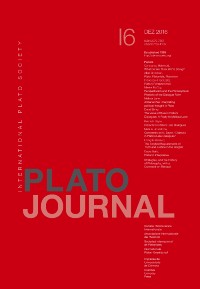Please use this identifier to cite or link to this item:
https://hdl.handle.net/10316.2/41890| DC Field | Value | Language |
|---|---|---|
| dc.contributor.author | Sayre, Kenneth | - |
| dc.date.accessioned | 2017-06-05T10:45:05Z | |
| dc.date.accessioned | 2020-10-04T18:43:20Z | - |
| dc.date.available | 2017-06-05T10:45:05Z | |
| dc.date.available | 2020-10-04T18:43:20Z | - |
| dc.date.issued | 2016 | - |
| dc.identifier.issn | 2079-7567 | - |
| dc.identifier.issn | 2183-4105 (PDF) | - |
| dc.identifier.uri | https://hdl.handle.net/10316.2/41890 | - |
| dc.description.abstract | Plato’s method of hypothesis is initiated in the Meno, is featured in the Phaedo and the Republic, and is further developed in the Theaetetus. His method of collection and division is mentioned in the Republic, is featured in the Phaedrus,and is elaborated with modifications in the Sophist and the Statesman. Both methods aim at definitions in terms of necessary and sufficient conditions. In the course of these developments, the former method is shown to be weak in its treatment of sufficient conditions, and the latter is shown to be comparably weak in its treatment of necessary conditions. A third method, which avoids these difficulties, is introduced in the first part of the Parmenides and is applied in connection with the eight hypotheses that follow. This application yields a demonstration of serious shortcomings both in historical Eleaticism and in the Eleatically-inspired theory of Forms in the Phaedo and the Republic, along with a demonstration of comparative strengths in historical Pythagoreanism and in the Pythagorean- inspiried theory of Forms in the Statesman and the Philebus. | eng |
| dc.language.iso | eng | - |
| dc.publisher | Imprensa da Universidade de Coimbra | - |
| dc.rights | open access | - |
| dc.subject | Method of hypothesis | eng |
| dc.subject | method of collection and division | eng |
| dc.subject | early theory of forms | eng |
| dc.subject | late theory of forms | eng |
| dc.subject | eight hypotheses of the Parmenides | eng |
| dc.subject | developmentalism | eng |
| dc.subject | interpreting Plato’s dialogues | eng |
| dc.title | Dialectic in Plato’s late dialogues | por |
| dc.type | article | - |
| uc.publication.collection | Plato Journal vol. 16 | - |
| uc.publication.firstPage | 81 | - |
| uc.publication.lastPage | 89 | - |
| uc.publication.location | Coimbra | - |
| uc.publication.journalTitle | Plato Journal | - |
| uc.publication.volume | 16 | por |
| dc.identifier.doi | 10.14195/2183-4105_16_7 | - |
| uc.publication.orderno | 7 | - |
| uc.publication.area | Artes e Humanidades | - |
| uc.publication.manifest | https://dl.uc.pt/json/iiif/10316.2/41890/267775/manifest?manifest=/json/iiif/10316.2/41890/267775/manifest | - |
| uc.publication.thumbnail | https://dl.uc.pt/retrieve/12131616 | - |
| item.grantfulltext | open | - |
| item.fulltext | With Fulltext | - |
| Appears in Collections: | Plato Journal | |
Files in This Item:
| File | Description | Size | Format | |
|---|---|---|---|---|
| dialectic_in_plato_s_late_dialogues.pdf | 1.32 MB | Adobe PDF |  |
Items in DSpace are protected by copyright, with all rights reserved, unless otherwise indicated.
